Postcards home from General Conference
Walking into a season of newness from Melissa Lauber – May 3
The “hard work and heart work” was completed and is just beginning. The General Conference closed by passing a budget and with a rapid flurry of voting on diverse matters from approving constitutional amendments on racism and equity for women and those with disabilities to outlining a path back into the ordained ministry for those who had to, in the past, surrender their clergy credentials because of their sexual orientation.
Delegates packed up or recycled the five volumes of Christian Advocates as they began to consider how the changes made in Charlotte will filter back into their home churches and beyond.
It will be a season of newness and promise, and we must take care to make it count for something meaningful and good. The experience of the past two weeks evokes the poem “The Vision” by Wendell Barry. What we’ve created will spread and “grow into legend, legend into song, song into sacrament.”
We are, each of us, God-embodied, an incarnational people. That is one of the things I’ll treasure most about this General Conference. That lesson was lived out in a thousand sacred moments.
And so we move forward — in struggle and in hope — willing to do hard things as we work as one to create wholeness and a sense of holy joy for all people. May it be so. Amen.
New Sprout. New Life. from Erik Alsgaard – May 1
 This morning, while walking from the Convention Center where General Conference is being held over to the nearby Whole Foods to pick up coffee, I noticed something that I wouldn’t have paid any attention to normally.
This morning, while walking from the Convention Center where General Conference is being held over to the nearby Whole Foods to pick up coffee, I noticed something that I wouldn’t have paid any attention to normally.
It’s a plant with green leaves growing out of a crack in the sidewalk. It’s not a weed. I know weeds; I have plenty of them growing in my gravel-filled driveway at home, in my yard, and around the house.
It’s not big, being not more than three inches tall. One of the leaves looks a big sickly, but that doesn’t seem to be affecting its growth.
It is, however, tenacious. It is there. It is doing its best to live…. even in the midst of the so-called “concrete jungle” that is not unique to downtown Charlotte.
As I looked at that plant, it struck me as an apt metaphor for what’s happened here at General Conference.
With the historic votes taken yesterday, and what is expected to take place today, The United Methodist Church is starting to sprout new life even in the midst of some great hardships.
Coming out of a season of disaffiliation and a pandemic, my beloved church voted yesterday to remove the ban on ordaining gay clergy.
New sprout. New life.
Regionalization also passed. Under the legislation, the U.S. and each central conference — church regions in Africa, Europe and the Philippines — would become regional conferences with the same authority to adapt the Book of Discipline, the denomination’s policy book, for more missional effectiveness.
New sprout. New life.
The General Conference also took time to recognize some historic firsts. Bishop Tracy S. Malone, from the East Ohio Conference, officially became president of the Council of Bishops. In so doing, she became the first Black woman bishop to hold that office.
New sprout. New life.
Bishop Karen Oliveto, episcopal leader of the Mountain Sky Conference, preached during a morning worship service, becoming the first openly gay bishop to preach at a worship service during General Conference.
New sprout. New life.
I could go on, but I hope you get the picture. I’ve been to eight General Conferences, and this one, from the beginning, felt different. Dare I say that this one, from the beginning, felt more Christ-like?
All I know is that I am going home more optimistic, more energetic, more proud of my church, and more ready to get back to serving and loving all of God’s people.
New sprout. New life.
Cause for Jubilation from Melissa Lauber – May 1
 Sea change!
Sea change!
It was so long in coming, so anticipated and wished for, and on the May 1 Consent Calendar, by a vote of 692 to 51, the discriminatory language that calls homosexuality incompatible with Christian teaching and prohibited the ordination of gay and lesbian people, was removed from the United Methodist Book of Discipline.
Within the BWC, most of the leaders have been living out of biblical obedience, refusing to discriminate against LGBTQ people. But the law of the church was always jarring – casting United Methodists into hurtful places of incongruence and heartbreak as they tried to reconcile the truth about themselves as children of God with the doctrine and polity of their church.
In the impromptu celebration that erupted as people realized what exactly was on the consent calendar, people hugged and cried and danced, singing Mark Miller’s anthem “Draw the Circle Wide.”
“This is one of those moments, we’ll be able to tell our grandchildren – we were there at the General Conference when this vote was cast. It’s breaking news. It’s historic,” said a member of the Peninsula-Delaware delegation.
It is historic. It’s also tears, and jubilation, and dreams so long deferred made real. It’s a sea change – a profound transformation in thought and action. It’s an answered prayer.
And from the Rev. TC Morrow, a Deacon in the Baltimore-Washington Conference, a prayer as we move forward: ‘May the Holy Spirit continue to move amongst us. May the Holy Spirit help us share the good news of Christ’s reconciling love and grace and equip us to be agents of change for a more just world.”
The Theology and Drama of a Good Financial Debate from Melissa Lauber – April 30
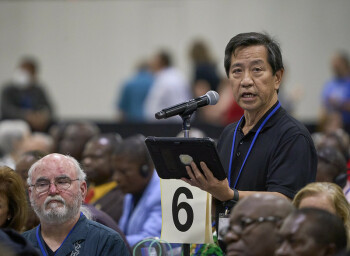 So, I am sick – a virus has me watching the proceedings of the day from a hotel bed across the street. But amidst all the serious and worshipful scenes unfolding at General Conference, it does, from this perspective, sometimes feel a little like good church theater.
So, I am sick – a virus has me watching the proceedings of the day from a hotel bed across the street. But amidst all the serious and worshipful scenes unfolding at General Conference, it does, from this perspective, sometimes feel a little like good church theater.
On April 30, the delegates had a fascinating debate – the BWC’s own Ken Ow was one of the leading voices.
The question was on whether to reduce apportionment payments paid by local churches or increase apportionment payments to provide more funding for ministries at the General Church level to continue and thrive.
The “base rate” is a key component used in calculating requested annual conference apportionments.
In an hour-and-a-half debate, the delegates debated about whether to follow the recommendation of the Financial Administrative Legislative Committee to raise the apportionment base rate to 2.9 percent. Or, to adopt a minority report, which was grounded in the advice of the General Councill of Financial and Administration to reduce the base rate to 2.6 percent.
Those who favored the lower rate cited months of financial analysis that pointed to financial challenges in local churches. The United Methodist Church, they said, has gone from a 91.8% collection rate in 2016 to 73.7% in 2022 and to a projected 68.5% in 2024. Local churches need relief so that they might use the money on creating and nurturing disciples in their communities.
Those who favored the 2.9 percent apportionment base called on the delegates to put their faith in United Methodist’s ability to rise to financial challenges. With God, all things are possible, and no one is more generous that a United Methodist whose heart has been strangely warmed. Also, they said, apportionment giving enabled the word of connectionalism – of General Agencies and ministries that allow us to reach beyond our local and regional boundaries.
Both groups were passionate.
Ultimately, the delegates compromised. They voted to reduce the base to 2.6% for 2025 and 2026. However, if apportionment collection rates are 90% or higher, the base rate will increase to 2.9% in 2027 and 2028.
It’s a debate that’s often held in many local churches – a spirit of prudence or abundance? Ultimately, I found myself most resonating with the prayer of Bishop Bard following the 366-362 vote, “Veni, Sancte Spiritus,” Come, Holy Spirit, come.
See the UMNS story on the apportionment base debate.
'We Do this Dance Together' from Melissa Lauber – April 28
It’s Sunday – a day of Sabbath rest for General Conference. Across the world, United Methodists are worshipping in 31,295 churches – 21,581 in the U.S. and 9,714 in the Central Conferences. My mind replays scenes from throughout the week – quirky, odd thoughts that create a mosaic of Methodism. Among them:
At the Mint Museum, a block from the Convention Center is a large sign: “Come Intrigued. Leave Inspired.” That seems like a good slogan for the church.
In my legislative committee, we sought to “bundle” petitions, putting them together to vote on as – a bundle. However, the interpreters informed us there is no word for “bundle” in their languages. Another word the Africans in the legislative committee didn’t understand was “transphobia.” Nor did they understand why there might be cause for “reparations,” for African Americans, which came up in one of the petitions. Were African Americans in the U.S. denied housing and access to education? We put aside the business of the committee for a while to share our thoughts about race and racism. It was a moment of connection – connectionalism – bundling at its best.
Another moment of connection came when I thought of the Revs. Charles Harrell and Rod Miller and all those in the BWC who created a global partnership between the BWC and United Methodists in Russia. On April 25, the delegates voted to allow the four Eurasian annual conference to leave the denomination and become autonomous. Bishop Eduard Khegay expressed his gratitude using the phrase for “thank you very much” in Russian: “Bolshoe spasibo.”
There are a lot of analysts and analysis among the delegates as the work progresses. One interesting account I read was from Mainstream UMC, which pointed out that every one of the 1,000+ petitions had a preliminary action taken on them this week. The committees can pass, reject, amend or refer. “About 80 percent will be rejected in committee and go on the consent calendar for rejection by the plenary. Of the 20 percent approved, most will go on the consent calendar for bulk approval. Fewer than 5 percent of the petitions are dealt with individually on the plenary floor and only about 1 percent make a substantive change to the Book of Discipline.
So, the work of the committees should not be underestimated. They also serve as a barometer for what lies ahead next week. Tension ran high in the Committee on Financial Administration, Mainstream UMC reported. The committee voted to increase the proposed budget by 12 percent or $40 million over four years. These questions of stewardship promise to stir up emotion as the church figures out how to best address shrinking resources.
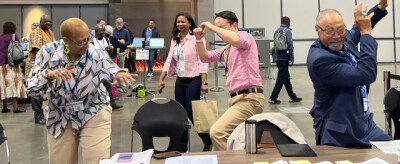 And on a brighter note, the chair of my legislative committee, proclaimed, “we do this dance together.” That reminded me of the Revs. Johnsie Cogman and Gerry Green, leaders in the BWC, who are serving as pages and found themselves dancing in joy as an African band performed during worship. It was a tiny moment of grace – and it sets the stage beautifully for next week to begin.
And on a brighter note, the chair of my legislative committee, proclaimed, “we do this dance together.” That reminded me of the Revs. Johnsie Cogman and Gerry Green, leaders in the BWC, who are serving as pages and found themselves dancing in joy as an African band performed during worship. It was a tiny moment of grace – and it sets the stage beautifully for next week to begin.
Home is Where the Heart Is from Rev. Laura Norvell – April 27
On the third and final day of legislative work, I sensed energy levels sagging - a little anxiety creeping in.
As folks moved toward the last afternoon session with LOTS of legislation still to be addressed, I took a quick trip to the restroom, passing a committee secretary, tucked in a corner near an outlet.
She was on a video call with family – I could hear a child’s squeal and hear in her response the telltale voice of a mama who was far from home, sitting on the floor in a corner, sharing love in the way she could at that moment – via technology.
It made my own mama-heart ache a little bit. These days are long and full of mind-bending work. They are full of God-moments and very human moments. They are days spent far from the comforts of home.
The commitment of our delegates is moving. They have come from all over the world. Half of them are clergy – and as clergy, perhaps these two weeks are part of a rhythm of their “job.”
But also sitting in these meetings are lay people with jobs and home lives and responsibilities well beyond the church. They are using precious vacation time or unpaid leave to be here – and they have spent weeks and months preparing, studying legislation, understanding the structure of decision making in our global church.
They are here because they have an experience of God’s transformation, because they have hope for our shared work to nurture disciples of Jesus, because they can see the Kin-dom of God emerging moment by moment, because they know that the work is shared work.
That mama hung up from her call and headed into a meeting where she would count and record vote tallies, including an historic vote to enter full communion with our Episcopal siblings in Christ, a piece of legislation that will before the whole body early in the week.
I pray she was bolstered for her historic work that afternoon by the excited squeal of someone at home who misses her very much.
Experiencing True Holy Conferencing from Rev. Erica Robinson-Johnson – April 27
I've 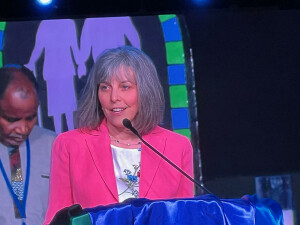 been serving all week as a parliamentarian in a legislative committee. That's something we don't do in our annual conferences of the affiliation. It gives a chance for small groups to discuss--using parliamentary procedure and conference rules but more informally--the legislation, and decide which items will be put on the consent calendar, which are defeated, and which will be sent to full plenary for debate. They have more time there to ask questions from the makers of the legislation and the stakeholders. They have more time to carefully craft amendments to perfect the petitions. It is the kind of work, true holy conferencing, that I wish our annual conferences engaged in, and not just during our short time together in May/June, but all year long.
been serving all week as a parliamentarian in a legislative committee. That's something we don't do in our annual conferences of the affiliation. It gives a chance for small groups to discuss--using parliamentary procedure and conference rules but more informally--the legislation, and decide which items will be put on the consent calendar, which are defeated, and which will be sent to full plenary for debate. They have more time there to ask questions from the makers of the legislation and the stakeholders. They have more time to carefully craft amendments to perfect the petitions. It is the kind of work, true holy conferencing, that I wish our annual conferences engaged in, and not just during our short time together in May/June, but all year long.
I also want to share a witness of the spirit of peace in this place and the overwhelmingly obvious change in the makeup of our delegations. We've never had such diversity at general conference among the voting members. And folks are showing up and speaking up with authenticity and receiving one another with grace. It also makes committee work more human-centered vs issue-centered. The decisions made here have real life impact and we are hearing and seeing that when we include and listen to one another, God smiles
My heart is overflowing with gratitude.
A Spirit Abides from Rev. Laura Norvell – April 26
I’m  staying about a mile from the convention center in Charlotte. Every morning, I walk a slightly different route, seeing new people and new things as I go.
staying about a mile from the convention center in Charlotte. Every morning, I walk a slightly different route, seeing new people and new things as I go.
Today, as I neared the convention center, I crossed a green space – a perfect backdrop for a peaceful moment.
Instead there was yelling.
Loud, fire and brimstone yelling.
Hateful words about people I know and love.
Claims about who God is and what God will do that I just don’t understand or believe.
All from one angry looking man wearing his khakis and a button-down shirt.
I was a few paces behind three other people headed into the convention center. As the yelling guy hurled his ugly words, one of them opened the door wide and said in a genuine and calm voice, “Brother, come in with us. You are welcome here.”
The man doubled down.
It felt so very different from everything else I have encountered this week.
All week, I feel like there has been a spirit of cautious hope and non-violence in the proceedings of General Conference.
I confess that feels a little unfamiliar to my own soul right now – after a very busy season and the long anticipation of what would happen here, I’ve been reactive, defensive. Not quite the angry guy outside, but…
In the colloquialism of my childhood, I’ve been “loaded for bear.”
But so far this week, in every room I’ve been in, in every conversation I’ve witnessed, in every proceeding I’ve consumed, there has been an openness. Even when it is not perfect, there is a spirit of curiosity, a spirit of longing, a spirit of hope, a spirit of peace. (In all fairness, know that there have been wildly imperfect moments – but even those have been marked by grace.)
There are still many days ahead. I am grateful for the moment of contrast between red-faced yelling guy and the man who held the door in invitation. I long for there to be more moments of grace and invitation.
For years to come.
Living Water from Rev. C. Anthony Hunt – April 26
(Reflections from Day Four)

Rivers of living water is the image that I see today as we sit in the General Conference. We are rivers flowing from the source that is the Sea, from the Sea that is God.
Today, I see flowing through the church rivers – gifts – of wonderful diversity – nations, races, genders, ethnicities, identities, tribes, cultures, traditions, and perspectives.
These are rivers – gifts – that remind us that we are fearfully, wonderfully, and beautifully made. These are rivers – gifts – that remind us that in Christ there is "neither Jew nor Greek, male nor female, bond nor free." (Galatians 3:28)
Rivers of living water are what I see today. These rivers beckon us to meet at the Sea – at the Source, the Divine, God – and to know that it is "very good and pleasant for kindred to live together in unity."(Ps. 133:1)
Might these rivers of living water lead us to meet at the Source and know that God is God.
Holding Each Other's Stories from Melissa Lauber – April 25
The biggest news of the day at General Conference was that the regionalization plan for the denomination passed. It will make the United States a region, give The United Methodist Church’s different regions equal standing in decision-making, and allow churches around the globe to do contextual ministry, shaping church polity and ministry to best fit cultural needs.
The legislation will now pass into the hands of annual conferences who need to vote with a 2/3 majority for the regionalization to become a part of the denomination’s constitution. It was a Hallelujah moment.
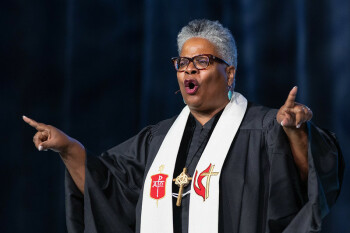 But for me, the more soul-stirring moment was when Bishop LaTrelle Easterling preached on ending violence against women in a “Thursdays in Black” worship service.
But for me, the more soul-stirring moment was when Bishop LaTrelle Easterling preached on ending violence against women in a “Thursdays in Black” worship service.
The Rev. Tony Love read the Scripture passage and Bishop Easterling “brought the fire,” those who heard her said. Her message was addressed to women who had suffered abuse, and to the church, which too often is silent, revictimizing women in both subtle and brutal ways.
My heart especially soared when the bishop let loose her rhetorical grandeur. At one moment, she actually said, “We are hypocrites if we celebrate resiliency without acknowledging that the church has been complicit in supporting a pedagogy of patriarchy that fuels a hermeneutic of hubris while too often refusing to dismantle systems of domination."
People around me pounded the table in agreement. But she also spoke simply and from the heart, telling survivors of violence that “you are strong. You are brave. And you are beloved of God.”
And that was just the morning. During the afternoon, the delegates went into their 14 legislative committees. The committees are how the business of the church gets done. During this first week, the delegates gather in small meeting rooms and debate and vote on 1,099 petitions sent in from individuals and groups throughout the denomination.
It’s a time for strong opinions and global community building.
In my committee, Church and Society 1, the 38 delegates were, for example, from Hawaii, Pittsburgh, the Democratic Republic of Congo, Russia, Sweden, Florida, the Philippines, Kentucky and the Dominican Republic.
In the introductions, we were asked to share one thing we valued about The United Methodist Church. The answers were as varied as the homelands: they valued the sense of family and connection, the focus on grace and social action, the theology of the open table, that you can bring your brain to worship, the abundance of resources, the music, and the stories that are born amid United Methodists.
“All of you are now holding my story,” one delegate said. “And the more stories we hear, the more we’ll clarify our understanding of God.”
Common Ground from Rev. C. Anthony Hunt – April 25
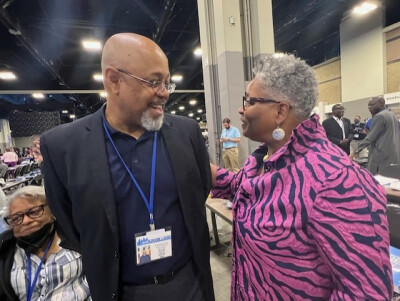 As we finish day two General Conference, today has been a long, hard, and yet hopeful day. Bishop Easterling met with our delegation today, and her question to us was, "How are you feeling?"
As we finish day two General Conference, today has been a long, hard, and yet hopeful day. Bishop Easterling met with our delegation today, and her question to us was, "How are you feeling?"
My reflective response is "I'm yet hopeful." Mine is a living hope that lies in something I wrote in a published work in 2019, which still holds for me today and for the work that's ahead for the General Conference.
"The quest for common ground, and by extension, the common good is at the heart of the church’s ministry, and hope for the future... For this reason, the church is called to model community, and must help the world see and achieve common ground, while believing that unity among human beings is possible - and community is fully evident - only if there is real justice for all people." (excerpt from “Come Go with Me," C. A. Hunt)
C. Anthony Hunt, D.Min., Ph.D.
Creating a church anew from Melissa Lauber – April 24
(Wednesday, April 24)
 At the General Conference session, there are interpreters sharing the proceedings in 10 languages. The delegates are encouraged to pray “in the language of their heart.”
At the General Conference session, there are interpreters sharing the proceedings in 10 languages. The delegates are encouraged to pray “in the language of their heart.”
For many, that heart language seems to be neither English, French, nor Swahili, but “change.” From the stage, several speakers during these first two days brought messages of transformation as the denomination, stands “at a crossroads,” “on a precipice of change,” in a liminal and seminal place, ready to pivot, facing challenges and opportunities in a time of reformation and renewal — ready to set a new course and write the next chapter in the life of the denomination. It’s a lot of pressure to put on one gathering.
But the denomination is now at a place where the 852 delegates and more than 1,000 observers who are present, really want to be in the room, said Bishop Thomas Bickerton in a sermon during opening worship on April 23. They see an opportunity to create a church that moves beyond divisions and disaffiliations and into the heart of what God is calling it to be.
Bishop Bickerton challenged the delegates with a question of vision and purpose. “Are you willing to move forward in a spirit of hope and embrace a season of reformation, commit to the revitalization of The United Methodist Church and work for a culture marked by compassion, courage and companionship,” he asked.
It’s a challenge the delegates seem have been waiting for, although specifically articulating how a new church culture will manifest itself feels like part of the work before them throughout the session. No one really seems to know what the vision will be — but everyone is certain we must follow the lead of the Holy Spirit. Be still and know that I am resonates.
 Bishop Jonathan Holston addressed this when he delivered the Episcopal Address on April 24, of behalf of the Council of Bishops. “When things are happening all around us, God uses the church to make a difference,” Holston said. “The church was never built for our pleasure. The church is built for God’s purpose.”
Bishop Jonathan Holston addressed this when he delivered the Episcopal Address on April 24, of behalf of the Council of Bishops. “When things are happening all around us, God uses the church to make a difference,” Holston said. “The church was never built for our pleasure. The church is built for God’s purpose.”
He acknowledged that the wisdom of former US ambassador and pastor Andrew Young, noting that the paradox of humanity can be described in this way: “We live in the tension of who we are, who we say we are and who we want to be.”
The church is in this tension today, Holston acknowledged, but “striving to be who God needs us to be, should be the only priority, he said.
The business of the conference is still getting started. Delegates have been warned of proposed dramatic budget cuts of more than 42 percent. Finding a sense of renewal amid such draconian measures will be an interesting challenge. But for now, the church is continuing “to become” and it’s speaking in the language of its heart.
Following protests, seeds of hope from Melissa Lauber – April 22
(Monday, April 22)
 It’s said that what you focus on, you become.
It’s said that what you focus on, you become.
When I attended my first General Conference in 1992, there were protests over the discriminatory language against LGBTQ people in the Book of Discipline. At the seven sessions since then there have been dramatic calls for inclusion: rows of people lining the sidewalk on their knees praying for the delegates as they entered the convention center, drumming and parades to stop debate, an impromptu Communion service of Doritos and soda after a session was thrown prematurely into recess.
There was even a chalice broken in anger, and then placed on the altar for the remainder of the session to symbolize the brokenness of the Church and its people. The protests lent an air of drama, they crafted a focus – and we became a diverse and divided church; we became a church that didn’t know how to differ and still love
This year’s disaffiliations changed that – a quarter of our churches stepped out of the denomination. Today, the drama and intrigue of protest lingers but it doesn’t seem as important.
Instead, at the General Conference, there is a T-shirt with a Latino proverb that says, “They tried to bury us, they didn’t know we were seeds.” The flowers in the design are outlined in the names of gay and lesbian pastors – part of the Queer Clergy Caucus.
This year, 55 gay and lesbian delegates will be seated – part of the United Methodist Queer Delegate Caucus. Removing the discriminatory language is high on the agenda of many progressive and centrist delegates. “We’re not disappearing while we’re being debated,” said the Rev. Austin Adkinson, of Puyallup, Wash.
If the discriminatory language, which calls homosexuality incompatible with Christian teaching and prohibits the ordination of homosexuals and the marriage of same-gender couples in United Methodist churches, is removed, church polity returns to neutral – as it was prior to 1972.
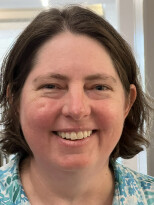 The Rev. T.C. Morrow, of Foundry UMC in Washington, D.C. and a member of the BWC’s Queer Clergy Caucus is hopeful the church embraces more than neutral. She is a believer in “living out hope.” It’s a careful kind of hope.
The Rev. T.C. Morrow, of Foundry UMC in Washington, D.C. and a member of the BWC’s Queer Clergy Caucus is hopeful the church embraces more than neutral. She is a believer in “living out hope.” It’s a careful kind of hope.
Hope abounds here, quietly and in whispered ways. Into the uncertainty of the wake of disaffiliation a new spirit is stirring. There’s a different kind of “vibe,” said the Rev. Leo Yates, a BWC Deacon and a member of the Queer Clergy Caucus. Rather than protests brewing, there’s a sense of grace — of offering and receiving grace.
Maybe it’s best expressed by a sticker being handed out in the exhibit hall at the General Commission on Archives and History booth. It’s a quote from Methodism’s founder, who preached about Christians going on to perfection. Wesley said: “I want you to be all love; that is the perfection I seek.” It’s a call worthy of our focus.
Assembling is a holy act from Melissa Lauber – April 22
Monday, April 22
 Before arriving at General Conference, I got to hear Pastor Rick Oursler of Melville Chapel UMC in Elkridge preach. “How we think about anxiety is how we think about God,” he said. How much are we willing to trust in God?
Before arriving at General Conference, I got to hear Pastor Rick Oursler of Melville Chapel UMC in Elkridge preach. “How we think about anxiety is how we think about God,” he said. How much are we willing to trust in God?
Then, I had the pleasure of hearing the Rev. Dr. Laura Norvell preach at Faith UMC in Rockville on Paul’s epistles. She told us about how God’s big story continues to be written today. “It is history, it is the present moment, and it is the future.” And, she imagined what a epistle might say if people generations from now wrote back to the people attending today’s General Conference.
In the voice of our descendants, she wrote about us, “God has put God’s hand on you for something special. When God’s message came to you, it wasn’t just words. Something happened in you. The Holy Spirit put steel in your convictions.
It’s interesting to me that each delegate that comes to General Conference will bring their most recent prayers and sermons with them. The church is created by their stories – a collective biography of 862 delegates called to gather from around the globe in one room in Charlotte, N.C.
The 29 General and Jurisdictional Conference delegates from the Baltimore-Washington Conference were elected in 2019. Over the years, we’ve met regularly, and I marvel at how different each of them is and how they each choose to live out their faith in such interesting ways. They are reverent and they are full of certainty and bold curiosity.
To assemble, to live out our stories together, is a sacred act.
May we not be anxious, may we believe in a powerful and loving God who acts within and through our well-storied church.

Thank you for your wisdom and reflection! Be blessed in this journey!